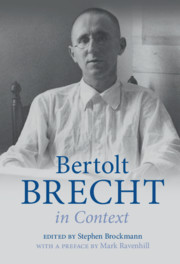Book contents
- Bertolt Brecht in Context
- Bertolt Brecht in Context
- Copyright page
- Contents
- Figure
- Notes on Contributors
- Chronology
- Abbreviations
- Preface
- A Note on Brecht in English
- Introduction
- Part I Brecht’s World
- Part II Brecht’s Work
- Chapter 13 The Work of the Theater
- Chapter 14 Brecht and Marxism
- Chapter 15 Brecht and Photography
- Chapter 16 Brecht and Film: Medium and Masses
- Chapter 17 Brecht and Fiction
- Chapter 18 Gestus in Context
- Chapter 19 Brecht’s Ethics
- Chapter 20 Brecht and Dialectics
- Chapter 21 Brecht and East Asia
- Chapter 22 Brecht’s Work with Musical Composers
- Part III The World’s Brecht
- Concise Bibliography
- Index
Chapter 13 - The Work of the Theater
from Part II - Brecht’s Work
Published online by Cambridge University Press: 28 May 2021
- Bertolt Brecht in Context
- Bertolt Brecht in Context
- Copyright page
- Contents
- Figure
- Notes on Contributors
- Chronology
- Abbreviations
- Preface
- A Note on Brecht in English
- Introduction
- Part I Brecht’s World
- Part II Brecht’s Work
- Chapter 13 The Work of the Theater
- Chapter 14 Brecht and Marxism
- Chapter 15 Brecht and Photography
- Chapter 16 Brecht and Film: Medium and Masses
- Chapter 17 Brecht and Fiction
- Chapter 18 Gestus in Context
- Chapter 19 Brecht’s Ethics
- Chapter 20 Brecht and Dialectics
- Chapter 21 Brecht and East Asia
- Chapter 22 Brecht’s Work with Musical Composers
- Part III The World’s Brecht
- Concise Bibliography
- Index
Summary
Brecht the theater theoretician is better described as the theater practitioner. His innovative concepts that have come to mark the modern theater were the product of his reflections on the experiments and lessons he learned from his collaborative work in the theater and on the stage. In short, Brecht’s staging practices ground the “Brechtian” approach to theater, even though he never articulated a formal acting method, sometimes contradicted himself, and rarely recommended that actors or theater practitioners with whom he worked read his theoretical writings. This essay traces the development of key concepts around notions of nonmimetic realism and anti-illusionary theater that fed into the epic theater as well as his views of anti-consumerist spectatorship, produced in the theater through episodic structure, distancing or Verfremdung, historicization, and the social Gestus. The centrality of contradiction and dialectical thinking became for Brecht the basis of negation and imagining innovative forms in the theater for his political agenda of changing society, most clearly accomplished in his model of the Lehrstück or learning play aimed at the collective learning process of the actors.
Keywords
- Type
- Chapter
- Information
- Bertolt Brecht in Context , pp. 115 - 122Publisher: Cambridge University PressPrint publication year: 2021

